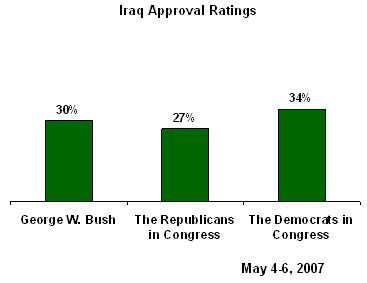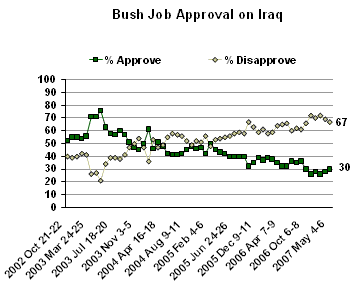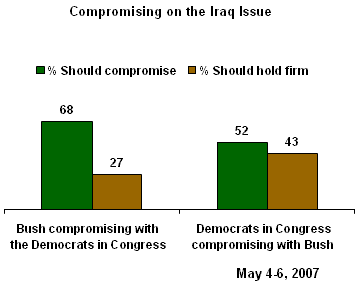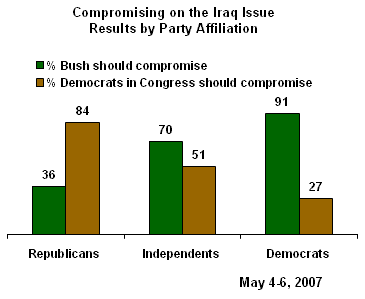GALLUP NEWS SERVICE
PRINCETON, NJ -- Americans report negative views of the way both President George W. Bush and the leaders in Congress are handling the situation in Iraq. A majority of Americans believe the war in Iraq was a mistake and a clear majority would like to see Congress set a timetable for withdrawal of troops from Iraq. A majority of Americans also want some sort of compromise in the showdown between Bush and Congress on the war. But Americans do not show much consensus about exactly who should yield -- Republicans want the Democrats in Congress to compromise and Democrats want Bush to compromise. Independents -- about one-third of the population -- tilt toward wanting Bush to move more toward the Democrats' position.
Approval Ratings on Handling Iraq
Americans report a low level of approval for the major U.S. political entities involved with the situation in Iraq at this point.

Bush's low level of approval on handling Iraq is not surprising, given his overall approval rating of just 34%. His current 30% rating on handling Iraq is also not the lowest during his administration. That point occurred twice -- during the first week of January 2007 and then again in February 2007 -- when the figure dipped to 26%. (Bush's highest approval rating on handling Iraq (76%) came in April 2003, just about a month after the war began.)

Since the Republicans in Congress have generally mirrored the Bush administration's positions on Iraq, it is also not surprising to find that the public also gives them a low approval rating on Iraq.
It is perhaps more surprising to find that Americans don't give the Democratic leaders more than a 34% approval rating on the issue, given that the majority of Americans (59%) favor the general Democratic position of setting a timetable for withdrawal of troops from Iraq.
It may be that Americans are frustrated with the fact that the Democratically-controlled Congress and the Bush administration are fighting about what to do about Iraq and are at a virtual stalemate on passing new funding legislation.
Buttressing this conclusion is the fact that most Americans want some sort of compromise to get things moving between Congress and the White House on the Iraq issue.

When Americans' responses to these two questions are combined, the data show that only 4% of Americans think that neither Bush nor the Democrats in Congress should compromise.
Do you think George W. Bush should compromise with the Democratic leaders in Congress on Iraq more than he has, or should he hold firm in his position?
|
Should compromise |
Should hold firm |
No opinion |
|
|
2007 May 4-6 |
68% |
27 |
5 |
Do you think the Democratic leaders in Congress should compromise with George W. Bush on Iraq more than they have, or should they hold firm in their position?
|
Should compromise |
Should hold firm |
No opinion |
|
|
2007 May 4-6 |
52% |
43 |
5 |
COMBINED RESPONSES: BASED ON FULL SAMPLE
|
2007 May 4-6 |
|
|
% |
|
|
Both sides should compromise |
29 |
|
Bush should compromise, Democrats should hold firm in their position |
37 |
|
Democrats should compromise, Bush should hold firm in his position |
22 |
|
Both sides should hold firm in their positions |
4 |
|
|
|
|
Mixed/no opinion |
7 |
The problem is, as can be seen, that there is no majority agreement about who should do the compromising. Less than one-third of Americans believe that both sides should comprise, leaving a majority who say that either Bush or the Democratic leaders should compromise, but not the other. Thirty-seven percent say that Bush should compromise, but not the Democrats. Twenty-two percent say that the Democrats should compromise, but not Bush.
The responses to these questions are quite partisan in nature -- as would be expected given the highly partisan nature of attitudes towards this war observed over the four years since the conflict began.

The tilt toward the higher overall percentage saying that Bush should compromise is due mainly to the views of independents, who are more likely to say that Bush should yield than to say the Democrats should. Also, to a lesser degree, Republicans are slightly less polarized on the issue of who should compromise than are Democrats.
Conclusion
The data reviewed in this analysis clearly indicate that Americans want political leaders in Washington to compromise in order to change the situation relating to Iraq. This desire for compromise may stem in part from the fact that at the moment Americans are not very positive about the way anyone in Washington is handling the Iraq situation. But large majorities of Republicans and Democrats are firm in saying that it is the other side that should "give" first.
These data mirror the difficulties facing the White House and the Democrats in Congress. Both sides have clear views on what should be done next in Iraq, and neither side wants to be the one who capitulates (or who is perceived as capitulating) to the other side. Hence, the current stalemate.
As reviewed in Gallup Poll Senior Editor Lydia Saad's story "Americans Favor Iraq Timetable, Don't Foresee Increased Terrorism" (see Related Items), it can be noted that Americans clearly want a timetable for withdrawing U.S. troops from Iraq. This finding, coupled with the data that show slightly more Americans want Bush to compromise than want the Democratic leaders in Congress to compromise, suggest that an agreement on the supplemental funding bill that tilts toward some type of timetable for withdrawal would be most acceptable to the American people. This conclusion is reinforced by the findings of a new CNN poll, conducted after President Bush's veto of a funding bill that included a timetable for withdrawal of troops from Iraq, which shows that a majority of Americans would like Congress to repeat its effort and pass still another similar bill including a timetable for withdrawal.
Survey Methods
Results are based on telephone interviews with 1,010 national adults, aged 18 and older, conducted May 4-6, 2007. For results based on the total sample of national adults, one can say with 95% confidence that the maximum margin of sampling error is ±3 percentage points. In addition to sampling error, question wording and practical difficulties in conducting surveys can introduce error or bias into the findings of public opinion polls.
